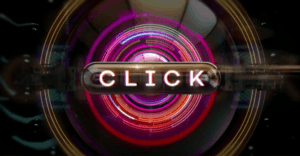Click (TV programme)
| Click | |
|---|---|
 | |
| Also known as | Click Online (2000–2005) |
| Presented by | Spencer Kelly |
| Country of origin | United Kingdom |
| No. of episodes | 960 (as of 1 October 2018) |
| Production | |
| Running time | 30 minutes (approx.) |
| Production company(s) | BBC News |
| Release | |
| Original network |
BBC News BBC World News BBC Two |
| Picture format |
576i (16:9 SDTV) 1080i (HDTV) |
| Original release | 2000 – present |
| Chronology | |
| Related shows | Click (radio programme) |
| External links | |
| Website | |
Click (previously Click Online) is a weekly BBC television programme covering news and recent developments in the world of consumer technology, presented by Spencer Kelly.
There are different editions of the programme broadcast, two 30-minute programmes: (shown on BBC News), a global edition (BBC World News), and a 15 minute version (BBC One and BBC News during BBC Breakfast). A 4 minute version also appears on BBC World News at selected times of the week.
Thursday 29 December 2005 marked the last edition of Click Online, as the show was previously known. This coincided with the departure of presenter Stephen Cole after 295 shows. The programme was rebranded with new music and titles and now concentrates more on consumer issues, and not necessarily the internet or what users can do or visit "online".
The 12 March 2016 programme was broadcast in 360-degrees, and is the first entire episode of a TV programme to be broadcast thus.[1]
BBC World Service broadcasts a weekly sister radio show, also called Click, presented by Gareth Mitchell and Bill Thompson.
Presenters
The presenter of Click is Spencer Kelly, who had already been a reporter and producer on the show, and also compiled reports for The Gadget Show on Channel 5. Kate Russell introduced featured websites in the weekly Webscape segment and now does general reporting. Other reporters include Dan Simmons, Lara Lewington, LJ Rich, Marc Cieslak, Nick Kwek, Sumi Das,[2] and Kate Russell[3]
Previous presenters of the show include Stephen Cole who left the BBC to work for Al Jazeera International.
Other journalists occasionally present segments of the programme[4]
Botnet controversy
In 2009 the show and the BBC produced some controversy when it aired a special episode highlighting the dangers of botnets and how easy it was to get caught in one. The show bought control of a botnet of some 22,000 infected computers (for "a few thousand dollars")[5] from a Russian hacker, and used it to send spam to an email address set up for the experiment and to perform a Distributed Denial of Service (DDoS) attack on a website set up by Prev-X (an internet security company that provided technical support for the show).[6] After the programme was made the computers on the botnet were sent a piece of software to remove the malware and a warning was sent to them telling the users what had happened and that they were vulnerable.
The response was mixed with the show receiving many emails both for and against the programme along with some negative press.[7][8] The BBC was criticized by some legal consulting organizations as well as computer security companies. Computer security expert and senior technology consultant at Sophos, Graham Cluley, asked in his blog whether the BBC was breaking the Computer Misuse Act - which makes it an offense in the UK to access or modify a third-party computer without the owner's consent.[9] However internet security commentator Melih Abdulhayoğlu, founder of international computer security company Comodo Group, made a video in support of the BBC.[10] Click rebutted criticisms by stating in its Twitter posts that:
| “ | We would not put out a show like this one without having taken legal advice. | ” |
The programme is aired in 15 and 30 minute versions and available in the UK on the BBC iPlayer.
Local versions
Persian-speakers can also watch BBC Persian Click online and on BBC Persian TV presented by Nima Akbarpour.[11] Further local versions are due to launch from Autumn 2018, including Click Tamil in October 2018, with the aim of having the show broadcast in up to 20 languages. [12]
References
- ↑ https://www.bbc.co.uk/news/technology-35787139
- ↑ "Sumi Das | BBC Journalist | Muck Rack". muckrack.com. Retrieved 2017-09-27.
- ↑ "Inspirational Woman: Kate Russell | TV Presenter | BBC Click - WeAreTheCity | Information, Networking, jobs & events for women". WeAreTheCity.com. 2015-02-02. Retrieved 2017-09-25.
- ↑ "About Click". BBC News. 6 January 2006. Retrieved 5 March 2013.
- ↑ "Gaining access to a hacker's world". BBC News. 13 March 2009. Retrieved 5 March 2013.
- ↑ Mills, Elinor (12 March 2009). "BBC buys, uses botnet to show dangers to PCs". CNET News. Retrieved 5 March 2013.
- ↑ Leyden, John (16 March 2009). "BBC Click paid cybercrooks to buy botnet". The Register. Retrieved 5 March 2013.
- ↑ "BBC cybercrime probe backfires". Stuff.co.nz. 16 March 2009. Retrieved 5 March 2013.
- ↑ "Did BBC break the law by using a botnet to send spam?". Naked Security. Sophos. 12 March 2009. Retrieved 5 March 2013.
- ↑ "Well Done, BBC". YouTube. 16 March 2009. Retrieved 5 March 2013.
- ↑ "About the programme". BBC News. 23 July 2010. Retrieved 5 March 2013.
- ↑ Click - Live in India, retrieved 2018-09-22
External links
- Click at BBC Online
- Click at BBC Programmes
